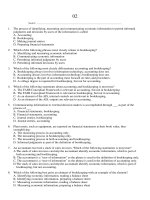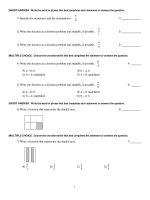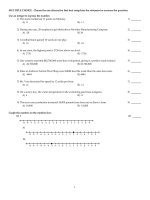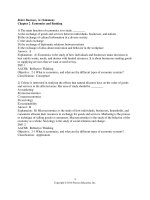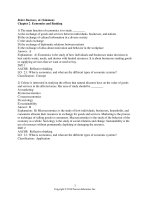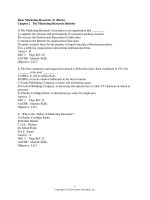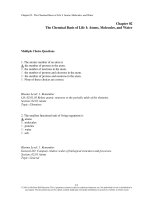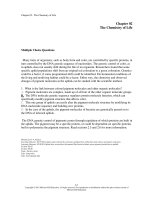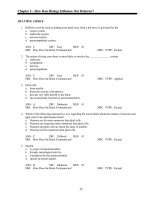M business 3rd edition ferrell test bank
Bạn đang xem bản rút gọn của tài liệu. Xem và tải ngay bản đầy đủ của tài liệu tại đây (393.11 KB, 38 trang )
02
Student: ___________________________________________________________________________
1.
Business ethics refers to principles and standards that define acceptable conduct in business
organizations.
True False
2.
Ethics and social responsibility mean the same thing.
True False
3.
Nearly all business decisions may be judged as right or wrong, ethical or unethical.
True False
4.
The most basic ethical concerns have been formalized through laws and regulations that encourage
conformity to society's values and norms.
True False
5.
All a business has to do to maintain ethical conduct is to follow the law.
True False
6.
Only corporations have to worry about ethics scandals and social responsibility issues.
True False
7.
An ethical issue is an identifiable problem, situation, or opportunity that requires a person or organization
to choose from among several actions that may be evaluated as ethical or unethical.
True False
8.
The best way to judge the ethics of a decision is to look at it from a manager's or employee's point of
view.
True False
9.
The size of the transaction, the history of personal relationships within the particular company, and many
other factors may determine whether a customer gift will be judged as ethical.
True False
10. Conflicts of interest are payments, gifts, or special favors intended to influence the outcome of a
decision.
True False
11. Ethics is related to the culture in which a business operates.
True False
12. Workplace bullying is an increasing problem.
True False
13. It is almost always easy to recognize specific ethical issues.
True False
14. Establishing and enforcing ethical standards and policies within business can help reduce unethical
behavior by prescribing which activities are acceptable and which are not and by removing the
opportunity to act unethically.
True False
15. Without a code of ethics or formal policy on ethics, employees are likely to base their decisions on how
their peers and superiors behave.
True False
16. Codes of ethics foster ethical behavior because they expand the opportunity to behave unethically.
True False
17. Ethical decisions in an organization are influenced by three key factors.
True False
18. Codes of ethics are formalized rules and standards that describe what the company expects of its
employees.
True False
19. There are four dimensions of social responsibility: economic, legal, ethical, and voluntary.
True False
20. The concept of social responsibility is universally accepted.
True False
21. One of the dimensions of social responsibility is metaphysical.
True False
22. Increasingly, companies are introducing eco-friendly and socially responsible products to their lines in
order to satisfy consumer demand and improve their images.
True False
23. Corporate citizenship is the extent to which businesses meet the legal, ethical, economic, and voluntary
responsibilities placed on them by their owners.
True False
24. Voluntary responsibilities are optional activities that promote human welfare or goodwill.
True False
25. Without employees, a business cannot carry out its goals.
True False
26. Recycling is a business response to employee issues.
True False
27. The right to safety requires that businesses provide a safe place for consumers to shop.
True False
28. A major social responsibility for business is providing equal opportunities for all employees.
True False
29. Americans use over 100 billion plastic bags annually and only recycle 10-20 percent of them.
True False
30. Managers consider social responsibility on an annual basis.
True False
31. The principles and standards that determine acceptable conduct in business are referred to as:
A. norms
B. strategies
C. ethics
D. laws
E. rules
32. Social _____________________ relates to a business's impact on society.
A. responsibility
B. strategy
C. ethics
D. law
E. rule
33. The _____________________ Act criminalized securities fraud and stiffened penalties for corporate
fraud.
A. EEOC
B. Ethical Standards
C. Internet Standards
D. Sarbanes-Oxley
E. SCF
34. What is considered ethical may differ depending on the _____________________ in which a business
operates.
A. country
B. culture
C. trade bloc
D. hemisphere
E. industry
35. Which of the following statements about business ethics is false?
A. It concerns the impact of a business's activities on society.
B. It refers to principles and standards that define acceptable behavior in business organizations.
C. It relates to an individual's values and moral standards and the resulting business decisions he or she
makes.
D What is ethical is determined by the public, government regulators, interest groups, competitors, and
. each individual's personal moral values.
E. Studying it can help you recognize ethical issues and understand how others make unethical decisions.
36. Studying business ethics will not necessarily
A. help you recognize ethical issues.
B. help you understand the importance of ethical decisions.
C. inform you concerning the impact of the work group on ethical decisions.
D. describe the ethical decision-making process.
E. tell you what you ought to do.
37. Ethical violations destroy
A. nothing.
B. jobs.
C. trust.
D. profits.
E. morale.
38. The Sarbanes-Oxley Act was passed to
A. punish those who committed accounting fraud in the late 1990s.
B. improve corporate profits.
C. help laid-off employees get their jobs back.
D. help investors recoup their losses.
E. help restore confidence in Corporate America.
39. Which of the following have not been cited as incidents of unethical business activity recently?
A. Unfair competitive practices in the computer industry
B. Deceptive advertising of medicines and toys
C. Accounting fraud
D. Deceptive advertising of food products
E. Corporate charitable giving is high
40. Which of the following statements is false?
A. Ethical issues are limited to for-profit organizations.
B. Business ethics goes beyond legal issues.
C. Ethical conduct builds trust among individuals and in business relationships.
D. Ethical conflicts may evolve into legal disputes.
E Regardless of what an individual feels about a particular action, if society judges it to be unethical, that
. judgment affects the organization's ability to achieve its objectives.
41. The most common ethical issue identified by employees is _____________________.
A. bullying
B. bribery
C. conflict of interest
D. cheating
E. lying
42. Managers use the _____________________ of their position to influence employees' actions.
A. authority
B. power
C. scope
D. responsibility
E. acceptance
43. __ involves taking someone else's work and presenting it as your own.
A. Copyright
B. Photosynthesis
C. Forecasting
D. Acceptance
E. Plagiarism
44. That businesspeople are expected not to harm customers, clients, and competitors knowingly through
deception, misrepresentation, coercion, or discrimination is part of
A. fairness and honesty.
B. communications.
C. conflict of interest.
D. business relationships.
E. consumerism.
45. If the video game marketer Playstation were investigated for allegedly raising prices excessively during
the Christmas buying season and thereby manipulating the supply of games available at that time, this
was an ethical issue concerned primarily with
A. conflict of interest.
B. communications.
C. fairness and honesty.
D. cost control.
E. game rules.
46. Making claims about dietary supplements or the health benefits of certain unproven ingredients is an
issue related to:
A. conflict of interest.
B. communications.
C. product design.
D. business relationships.
E. financing.
47. The warning on cigarette packages about the health implications of smoking is an example of which of
the following ethical issues?
A. Conflict of interest
B. Fairness and honesty
C. Communications
D. Relationships within a business
E. Environmental issues
48. The following behavior is an example of ethical consideration within business relationships:
A. keeping company secrets.
B. avoiding obligations.
C. shirking responsibilities.
D. setting a poor example for others.
E. offering a bribe.
49. If a manager pressures a subordinate to engage in activities that he or she may otherwise view as
unethical, such as accounting fraud or stealing a competitor's secrets, there exists an ethical issue related
to
A. plagiarism.
B. business relationships.
C. communications.
D. fairness and honesty.
E. conflicts of interest.
50. If an employee learned of a significant cost-saving idea from a coworker and then informed management
of the idea without revealing its true source, then the employee would be involved in
A. keeping a secret.
B. career advancement.
C. plagiarism.
D. socialism.
E. egalitarianism.
51. Many employees utilize different _____________________ at work than they do at home.
A. ethical standards
B. codes of ethics
C. conflicts of interest
D. communication skills
E. body language
52. A large number of _____________________ cases result in dismissal of the employee, even though the
government has tried to take steps to protect workers and to encourage reporting of misconduct.
A. executive
B. white collar crime
C. whistleblower
D. petty theft
E. federal
53. _____________________ is the extent to which businesses meet the legal, ethical, economic and
voluntary responsibilities placed on them by their stakeholders.
A. A code of conduct
B. A code of ethics
C. Egalitarianism
D. Corporate citizenship
E. Whistleblowing
54. A set of formalized rules and standards that describe what a company expects of its employees is called
a(n)
A. code of ethics.
B. opportunity.
C. moral philosophy.
D. guideline.
E. law.
55. What is the act of an employee exposing an employer's wrongdoing to outsiders?
A. Fraud
B. Whistleblowing
C. Plagiarism
D. Mayhem
E. A criminal lawsuit
56. Codes of ethics foster ethical behavior by all of the following except
A. expanding the opportunity to behave ethically by providing rewards for following the rules.
B. limiting the opportunity to behave unethically by providing punishments for violations of the rules and
standards.
C. limiting the opportunity to behave unethically by providing rewards for violations of the rules and
standards.
D. expanding the opportunity to behave ethically by providing punishments for following the rules.
E. encouraging employees to bend the rules.
57. Unethical behavior in business can be reduced if management does all of the following except
A. establish clear policies on unethical behavior.
B. limit opportunities for unethical behavior.
C. establish formal rules and procedures.
D. punish unethical behavior firmly.
E. depend totally on employees' personal ethics.
58. According to the text, ethical decisions in an organization are influenced by (1) individual moral
standards, (2) the influence of managers and co-workers, and (3)
A. religious values.
B. informal ethical policies or rules.
C. opportunity codes and compliance requirements.
D. family influence.
E. the founder's values.
59. Which of the following should help reduce the incidence of unethical behavior in an organization?
A Understanding that individual moral standards, the influence of managers and coworkers, and
. opportunity influence ethical behavior
B. Maximizing ethical conflict in work groups
C. Expanding opportunity by providing punishments for violations of the rules
D. Overlooking violations of codes of ethics
E. All of the above
60. A code of ethics represents _____________________ rules and standards of what a company expects of
its employees.
A. team
B. impoverished
C. authority-obedience
D. formalized
E. situational
61. Obeying the law is a business' _____________________.
A. right
B. choice
C. economic responsibility
D. legal responsibility
E. ethical responsibility
62. Approximately _____________________ percent of Fortune 500 companies engage in recycling
efforts.
A. 75
B. 83
C. 38
D. 57
E. 20
63. Which is NOT a dimension of social responsibility?
A. Legal
B. Philosophic
C. Economic
D. Voluntary
E. Ethical
64. _____________________ is the activities that individuals, groups, and organizations undertake to protect
their rights as consumers.
A. Consumerism
B. Civil rights
C. Protectionism
D. Conspicuous consumption
E. Shopping
65. John F. Kennedy's consumer bill of rights outlined four rights: the right to be informed, the right to
choose, the right to be heard and:
A. The right to government regulations
B. The right to good service
C. The right to easy credit
D. The right to shop wherever you want
E. The right to safety
66. Being profitable relates to which social responsibility dimension?
A. Economic
B. Voluntary
C. Ethical
D. Legal
E. Corporate citizenship
67. Which of the following is not one of the dimensions of social responsibility?
A. Voluntary
B. Economic
C. Legal
D. Ethical
E. Altruistic
68. Philanthropic contributions made by a business to a charitable organization represent which dimension of
social responsibility?
A. Corporate citizenship
B. Economic
C. Legal
D. Ethical
E. Voluntary
69. Consumers vote against firms they view as socially irresponsible by not
A. boycotting the company's products.
B. expressing dissatisfaction by protesting.
C. writing their representatives in Congress.
D. buying the company's products.
E. filing complaints with the company.
70. Studies have found a direct link between social responsibility and _____________________ in
business.
A. profitability
B. ethics
C. declining stock prices
D. happiness of stakeholders
E. global Warming
71. Water and soil pollution from oil and gas drilling is primarily what type of concern?
A. Consumer relations
B. Environmental issues
C. Community relations
D. Employee relations
E. Relations with stockholders
72. Which of the following is not an area of environmental concern in society today?
A. Animal rights
B. Land pollution
C. Waste disposal
D. The hard-core unemployed
E. Business practices that harm endangered wildlife
73. Laws regarding safety in the workplace are enforced by _____________________.
A. FTC
B. OSHA
C. EPA
D. the consumer bill of rights
E. codes of ethics
74. One role of the FTC's Bureau of Consumer Protection is to protect consumers from
_____________________.
A. ethics
B. fraud
C. laws
D. power
E. unity of command
75. Approximately _____________________ percent of Fortune 500 companies have a written
environmental policy.
A. 3
B. 23
C. 43
D. 63
E. 83
76. Corporations contribute more than _____________________ to environmental and social causes each
year.
A. $2 million
B. $2 billion
C. $12 billion
D. $12 million
E. No money
77. The _____________________ gives consumers the freedom to review complete information about the
products they are buying.
A. right to be informed
B. right to be heard
C. right to purchase
D. right to choose
E. right to speak out
78. A major social responsibility for businesses is providing _____________________ for all employees.
A. equal wages
B. equal opportunities
C. more free time
D. better healthcare
E. equal holiday pay
79. _____________________ refers to attaching a positive environmental association on an unsuitable
product or service.
A. Greenwashing
B. Whitewashing
C. Environmentalism
D. Corporate citizenship
E. Community relations
80. Many businesses, recognizing that employees lack many basic work skills, are becoming more concerned
about the quality of _____________________ in the United States.
A. job opportunities
B. education
C. philanthropy
D. management
E. community relations
81. What is business ethics?
82. Choose an issue that has been prominently featured in the news and discuss the ethical implications of
this issue. Make sure to define any key terms that you use in your response.
83. What are some of the general ethical issues in business?
84. How do you recognize an ethical issue in business?
85. How can an organization improve ethical behavior?
86. Why is it increasingly common for organizations to have a code of ethics and compliance programs?
87. What are the four dimensions of social responsibility?
88. Discuss what companies have done to address environmental concerns and to become more
sustainable.
89. Discuss the sustainability issues managers must confront in dealing with social responsibility issues.
90. Discuss the community relations issues that concern businesses.
02 Key
1.
Business ethics refers to principles and standards that define acceptable conduct in business
organizations.
TRUE
Business ethics are principles and standards that define acceptable behavior for individuals within an
organization as well as the organization at large.
AACSB: Ethics
Blooms: Remember
Difficulty: 1 Easy
Ferrell - Chapter 02 #1
Learning Objective: 02-01 Define business ethics and social responsibility; and examine their importance.
Topic: Business Ethics and Social Responsibility
2.
Ethics and social responsibility mean the same thing.
FALSE
Business ethics are the principles and standards that determine acceptable conduct in businesses.
Social responsibility is a broader concept. It is a business's obligation to maximize its positive impact
and minimize its negative impact on society.
AACSB: Ethics
Blooms: Remember
Difficulty: 1 Easy
Ferrell - Chapter 02 #2
Learning Objective: 02-01 Define business ethics and social responsibility; and examine their importance.
Topic: Business Ethics and Social Responsibility
3.
Nearly all business decisions may be judged as right or wrong, ethical or unethical.
TRUE
Business decisions, either by law or by society, will be deemed an acceptable practice or not.
AACSB: Ethics
Blooms: Remember
Difficulty: 2 Medium
Ferrell - Chapter 02 #3
Learning Objective: 02-01 Define business ethics and social responsibility; and examine their importance.
Topic: The Role of Ethics in Business
4.
The most basic ethical concerns have been formalized through laws and regulations that encourage
conformity to society's values and norms.
TRUE
The Sarbanes-Oxley Act was passed in 2002 by Congress to criminalize securities fraud as well as
stiffen corporate fraud. This was a response to public outcry regarding accounting scandals in the
early 2000s and to restore confidence in Corporate America.
AACSB: Ethics
Blooms: Remember
Difficulty: 2 Medium
Ferrell - Chapter 02 #4
Learning Objective: 02-01 Define business ethics and social responsibility; and examine their importance.
Topic: Business Ethics and Social Responsibility
5.
All a business has to do to maintain ethical conduct is to follow the law.
FALSE
Business ethics goes beyond legal issues by building trust among individuals and in business
relationships which validates and promotes confidence among those relationships.
AACSB: Ethics
Blooms: Remember
Difficulty: 1 Easy
Ferrell - Chapter 02 #5
Learning Objective: 02-01 Define business ethics and social responsibility; and examine their importance.
Topic: The Role of Ethics in Business
6.
Only corporations have to worry about ethics scandals and social responsibility issues.
FALSE
Ethical issues are not limited to for-profit corporations but include government, non-profits such as
universities, sports and individuals.
AACSB: Ethics
Blooms: Remember
Difficulty: 1 Easy
Ferrell - Chapter 02 #6
Learning Objective: 02-02 Detect some of the ethical issues that may arise in business.
Topic: The Role of Ethics in Business
7.
An ethical issue is an identifiable problem, situation, or opportunity that requires a person or
organization to choose from among several actions that may be evaluated as ethical or unethical.
TRUE
In business, this choice usually involves weighing monetary gain against what a person considers
appropriate conduct.
AACSB: Ethics
Blooms: Remember
Difficulty: 1 Easy
Ferrell - Chapter 02 #7
Learning Objective: 02-02 Detect some of the ethical issues that may arise in business.
Topic: The Role of Ethics in Business
8.
The best way to judge the ethics of a decision is to look at it from a manager's or employee's point of
view.
FALSE
The best way to judge the ethics of a decision is to look at it from a customer's or competitor's point of
view.
AACSB: Ethics
Blooms: Remember
Difficulty: 2 Medium
Ferrell - Chapter 02 #8
Learning Objective: 02-02 Detect some of the ethical issues that may arise in business.
Topic: The Role of Ethics in Business
9.
The size of the transaction, the history of personal relationships within the particular company, and
many other factors may determine whether a customer gift will be judged as ethical.
TRUE
This explains why a person needs several years experience in identifying what constitutes an ethical
and unethical decision due to its complex nature.
AACSB: Ethics
Blooms: Remember
Difficulty: 2 Medium
Ferrell - Chapter 02 #9
Learning Objective: 02-02 Detect some of the ethical issues that may arise in business.
Topic: The Role of Ethics in Business
10.
Conflicts of interest are payments, gifts, or special favors intended to influence the outcome of a
decision.
FALSE
Conflicts of interest exist when a person must choose between advancing his or her own personal
interests or those of others. Bribes are payments, gifts, or special favors intended to influence the
outcome of a decision.
AACSB: Ethics
Blooms: Remember
Difficulty: 1 Easy
Ferrell - Chapter 02 #10
Learning Objective: 02-02 Detect some of the ethical issues that may arise in business.
Topic: The Role of Ethics in Business
11.
Ethics is related to the culture in which a business operates.
TRUE
Different cultures adhere to different ethical standards such as in the U.S. it could be viewed as a
bribe to bring a gift to a business meeting but in Japan it is considered impolite to not bring a gift to a
business meeting.
AACSB: Ethics
Blooms: Remember
Difficulty: 1 Easy
Ferrell - Chapter 02 #11
Learning Objective: 02-02 Detect some of the ethical issues that may arise in business.
Topic: The Role of Ethics in Business
12.
Workplace bullying is an increasing problem.
TRUE
The Workplace Bullying Institute's latest survey found that "37% of U.S. workers have been bullied,
that is 54 million Americans."
AACSB: Ethics
Blooms: Remember
Difficulty: 1 Easy
Ferrell - Chapter 02 #12
Learning Objective: 02-02 Detect some of the ethical issues that may arise in business.
Topic: The Role of Ethics in Business
13.
It is almost always easy to recognize specific ethical issues.
FALSE
It is usually difficult to recognize specific ethical issues in practice.
AACSB: Ethics
Blooms: Remember
Difficulty: 1 Easy
Ferrell - Chapter 02 #13
Learning Objective: 02-03 Specify how businesses can promote ethical behavior.
Topic: The Role of Ethics in Business
14.
Establishing and enforcing ethical standards and policies within business can help reduce unethical
behavior by prescribing which activities are acceptable and which are not and by removing the
opportunity to act unethically.
TRUE
Ethics codes and compliance requirements reduce the opportunity to act unethically and consistently
enforcing repercussions for unethical behavior reduces unethical acts by individuals within an
organization.
AACSB: Ethics
Blooms: Remember
Difficulty: 2 Medium
Ferrell - Chapter 02 #14
Learning Objective: 02-03 Specify how businesses can promote ethical behavior.
Topic: The Role of Ethics in Business
15.
Without a code of ethics or formal policy on ethics, employees are likely to base their decisions on
how their peers and superiors behave.
TRUE
A code of ethics ensures all employees, including senior level executives, are clear on what ethical
standards are expected of them.
AACSB: Ethics
Blooms: Remember
Difficulty: 2 Medium
Ferrell - Chapter 02 #15
Learning Objective: 02-03 Specify how businesses can promote ethical behavior.
Topic: The Role of Ethics in Business
16.
Codes of ethics foster ethical behavior because they expand the opportunity to behave unethically.
FALSE
Codes of ethics foster ethical behavior because they reduce the opportunity to behave unethically.
AACSB: Ethics
Blooms: Remember
Difficulty: 1 Easy
Ferrell - Chapter 02 #16
Learning Objective: 02-03 Specify how businesses can promote ethical behavior.
Topic: The Role of Ethics in Business
17.
Ethical decisions in an organization are influenced by three key factors.
TRUE
Ethical decisions in an organization are influenced by three key factors: individual moral standards,
the influence of managers and co-workers, and the opportunity to engage in misconduct.
AACSB: Ethics
Blooms: Remember
Difficulty: 2 Medium
Ferrell - Chapter 02 #17
Learning Objective: 02-03 Specify how businesses can promote ethical behavior.
Topic: The Role of Ethics in Business
18.
Codes of ethics are formalized rules and standards that describe what the company expects of its
employees.
TRUE
Codes of ethics do not take into consideration every situation but it should provide a clear means of
appropriate behavior and steps to take in addressing ethical issues and/or concerns.
AACSB: Ethics
Blooms: Remember
Difficulty: 1 Easy
Ferrell - Chapter 02 #18
Learning Objective: 02-03 Specify how businesses can promote ethical behavior.
Topic: The Role of Ethics in Business
19.
There are four dimensions of social responsibility: economic, legal, ethical, and voluntary.
TRUE
There are four dimensions of social responsibility: economic, legal, ethical, and voluntary.
AACSB: Ethics
Blooms: Remember
Difficulty: 1 Easy
Ferrell - Chapter 02 #19
Learning Objective: 02-04 Explain the four dimensions of social responsibility.
Topic: The Nature of Social Responsibility
20.
The concept of social responsibility is universally accepted.
FALSE
Even though the concept of social responsibility is receiving more and more attention, it is still not
universally accepted.
AACSB: Ethics
Blooms: Remember
Difficulty: 2 Medium
Ferrell - Chapter 02 #20
Learning Objective: 02-04 Explain the four dimensions of social responsibility.
Topic: The Nature of Social Responsibility
21.
One of the dimensions of social responsibility is metaphysical.
FALSE
The economic responsibilities include earning a profit, the legal responsibilities include abiding by
laws, the ethical responsibilities include doing what is right and the voluntary responsibilities include
promoting goodwill.
AACSB: Ethics
Blooms: Remember
Difficulty: 1 Easy
Ferrell - Chapter 02 #21
Learning Objective: 02-04 Explain the four dimensions of social responsibility.
Topic: The Nature of Social Responsibility
22.
Increasingly, companies are introducing eco-friendly and socially responsible products to their lines in
order to satisfy consumer demand and improve their images.
TRUE
To respond to climate change concerns and fair labor concerns, many companies including Walmart
have increased their eco-friendly offerings.
AACSB: Ethics
Blooms: Remember
Difficulty: 1 Easy
Ferrell - Chapter 02 #22
Learning Objective: 02-04 Explain the four dimensions of social responsibility.
Topic: The Nature of Social Responsibility
23.
Corporate citizenship is the extent to which businesses meet the legal, ethical, economic, and
voluntary responsibilities placed on them by their owners.
FALSE
Corporate citizenship is the extent to which businesses meet the legal, ethical, economic, and
voluntary responsibilities placed on them by various stakeholders.
AACSB: Ethics
Blooms: Remember
Difficulty: 2 Medium
Ferrell - Chapter 02 #23
Learning Objective: 02-04 Explain the four dimensions of social responsibility.
Topic: The Nature of Social Responsibility
24.
Voluntary responsibilities are optional activities that promote human welfare or goodwill.
TRUE
Voluntary responsibilities are not required but contribute to the community and quality of life.
AACSB: Ethics
Blooms: Remember
Difficulty: 2 Medium
Ferrell - Chapter 02 #24
Learning Objective: 02-04 Explain the four dimensions of social responsibility.
Topic: The Nature of Social Responsibility
25.
Without employees, a business cannot carry out its goals.
TRUE
Employees are critical to maintaining a functional and profitable business.
AACSB: Ethics
Blooms: Remember
Difficulty: 1 Easy
Ferrell - Chapter 02 #25
Learning Objective: 02-05 Debate an organizations social responsibilities to owners; employees; consumers; the environment; and the community.
Topic: The Nature of Social Responsibility
26.
Recycling is a business response to employee issues.
FALSE
Recycling is a business response to environmental issues.
AACSB: Ethics
Blooms: Remember
Difficulty: 1 Easy
Ferrell - Chapter 02 #26
Learning Objective: 02-05 Debate an organizations social responsibilities to owners; employees; consumers; the environment; and the community.
Topic: The Nature of Social Responsibility
27.
The right to safety requires that businesses provide a safe place for consumers to shop.
TRUE
The right to safety was one of the consumer rights outlined by John F Kennedy in 1962. It continues
to be a concern among product recalls and increased outsourcing of manufacturing.
AACSB: Ethics
Blooms: Remember
Difficulty: 2 Medium
Ferrell - Chapter 02 #27
Learning Objective: 02-05 Debate an organizations social responsibilities to owners; employees; consumers; the environment; and the community.
Topic: The Nature of Social Responsibility
28.
A major social responsibility for business is providing equal opportunities for all employees.
TRUE
A major legal and social responsibility for business is providing equal opportunities for all employees
regardless of their sex, age, race, religion or nationality.
AACSB: Ethics
Blooms: Remember
Difficulty: 1 Easy
Ferrell - Chapter 02 #28
Learning Objective: 02-05 Debate an organizations social responsibilities to owners; employees; consumers; the environment; and the community.
Topic: The Nature of Social Responsibility
29.
Americans use over 100 billion plastic bags annually and only recycle 10-20 percent of them.
TRUE
Companies are seeking alternatives to plastic bags and other waste, as they have become such a
ubiquitous problem globally.
AACSB: Ethics
Blooms: Remember
Difficulty: 1 Easy
Ferrell - Chapter 02 #29
Learning Objective: 02-05 Debate an organizations social responsibilities to owners; employees; consumers; the environment; and the community.
Topic: The Nature of Social Responsibility
30.
Managers consider social responsibility on an annual basis.
FALSE
Managers consider social responsibility on an ongoing, often daily basis as with ethical concerns.
AACSB: Ethics
Blooms: Remember
Difficulty: 1 Easy
Ferrell - Chapter 02 #30
Learning Objective: 02-05 Debate an organizations social responsibilities to owners; employees; consumers; the environment; and the community.
Topic: The Nature of Social Responsibility
31.
The principles and standards that determine acceptable conduct in business are referred to as:
A. norms
B. strategies
C. ethics
D. laws
E. rules
Business ethics is defined as the principles and standards that determine acceptable conduct in
business.
AACSB: Ethics
Blooms: Remember
Difficulty: 1 Easy
Ferrell - Chapter 02 #31
Learning Objective: 02-01 Define business ethics and social responsibility; and examine their importance.
Topic: The Role of Ethics in Business
32.
Social _____________________ relates to a business's impact on society.
A. responsibility
B. strategy
C. ethics
D. law
E. rule
Social responsibility is a business's obligation to maximize its positive impact and minimize its
negative impact on society.
AACSB: Reflective Thinking
Blooms: Remember
Difficulty: 1 Easy
Ferrell - Chapter 02 #32
Learning Objective: 02-01 Define business ethics and social responsibility; and examine their importance.
Topic: The Role of Ethics in Business
33.
The _____________________ Act criminalized securities fraud and stiffened penalties for corporate
fraud.
A. EEOC
B. Ethical Standards
C. Internet Standards
D. Sarbanes-Oxley
E. SCF
Congress passed the Sarbanes-Oxley Act in response to several prominent accounting scandals. The
Act criminalized securities fraud and stiffened penalties for corporate fraud.
AACSB: Ethics
Blooms: Remember
Difficulty: 2 Medium
Ferrell - Chapter 02 #33
Learning Objective: 02-01 Define business ethics and social responsibility; and examine their importance.
Topic: The Role of Ethics in Business
34.
What is considered ethical may differ depending on the _____________________ in which a business
operates.
A. country
B. culture
C. trade bloc
D. hemisphere
E. industry
The acceptability of behavior in business varies in part depending on local values, moral principles,
and customs.
AACSB: Ethics
Blooms: Understand
Difficulty: 2 Medium
Ferrell - Chapter 02 #34
Learning Objective: 02-01 Define business ethics and social responsibility; and examine their importance.
Topic: The Role of Ethics in Business
35.
Which of the following statements about business ethics is false?
A. It concerns the impact of a business's activities on society.
B. It refers to principles and standards that define acceptable behavior in business organizations.
C. It relates to an individual's values and moral standards and the resulting business decisions he or
she makes.
D What is ethical is determined by the public, government regulators, interest groups, competitors,
. and each individual's personal moral values.
E. Studying it can help you recognize ethical issues and understand how others make unethical
decisions.
Social responsibility concerns the impact of a business's activities on society.
AACSB: Ethics
Blooms: Remember
Difficulty: 1 Easy
Ferrell - Chapter 02 #35
Learning Objective: 02-01 Define business ethics and social responsibility; and examine their importance.
Topic: Business Ethics and Social Responsibility
36.
Studying business ethics will not necessarily
A. help you recognize ethical issues.
B. help you understand the importance of ethical decisions.
C. inform you concerning the impact of the work group on ethical decisions.
D. describe the ethical decision-making process.
E. tell you what you ought to do.
Others such as your peers, family, and co-workers will judge your actions and decisions to be ethical
or unethical.
AACSB: Ethics
Blooms: Remember
Difficulty: 1 Easy
Ferrell - Chapter 02 #36
Learning Objective: 02-01 Define business ethics and social responsibility; and examine their importance.
Topic: The Role of Ethics in Business
37.
Ethical violations destroy
A. nothing.
B. jobs.
C. trust.
D. profits.
E. morale.
Ethical conduct builds trust and credibility therefore when ethical violations are committed, it is very
difficult, to restore trust and confidence.
AACSB: Ethics
Blooms: Remember
Difficulty: 3 Hard
Ferrell - Chapter 02 #37
Learning Objective: 02-01 Define business ethics and social responsibility; and examine their importance.
Topic: The Role of Ethics in Business
38.
The Sarbanes-Oxley Act was passed to
A. punish those who committed accounting fraud in the late 1990s.
B. improve corporate profits.
C. help laid-off employees get their jobs back.
D. help investors recoup their losses.
E. help restore confidence in Corporate America.
The Sarbanes-Oxley Act was passed in 2002 by Congress to criminalize securities fraud as well as
stiffen corporate fraud. This was a response to public outcry regarding accounting scandals in the
early 2000s and to restore confidence in Corporate America.
AACSB: Ethics
Blooms: Remember
Difficulty: 2 Medium
Ferrell - Chapter 02 #38
Learning Objective: 02-01 Define business ethics and social responsibility; and examine their importance.
Topic: Business Ethics and Social Responsibility
39.
Which of the following have not been cited as incidents of unethical business activity recently?
A. Unfair competitive practices in the computer industry
B. Deceptive advertising of medicines and toys
C. Accounting fraud
D. Deceptive advertising of food products
E. Corporate charitable giving is high
National newspapers such as USA Today or Wall Street Journal regularly cover examples of ethical
issues across industries. Corporate charitable giving is not an incidence of unethical conduct.
AACSB: Ethics
Blooms: Remember
Difficulty: 2 Medium
Ferrell - Chapter 02 #39
Learning Objective: 02-01 Define business ethics and social responsibility; and examine their importance.
Topic: The Role of Ethics in Business
40.
Which of the following statements is false?
A. Ethical issues are limited to for-profit organizations.
B. Business ethics goes beyond legal issues.
C. Ethical conduct builds trust among individuals and in business relationships.
D. Ethical conflicts may evolve into legal disputes.
E Regardless of what an individual feels about a particular action, if society judges it to be unethical,
. that judgment affects the organization's ability to achieve its objectives.
Ethical issues are not limited to for-profit corporations but include government, non-profits such as
universities, sports and individuals.
AACSB: Ethics
Blooms: Remember
Difficulty: 2 Medium
Ferrell - Chapter 02 #40
Learning Objective: 02-01 Define business ethics and social responsibility; and examine their importance.
Topic: The Role of Ethics in Business
41.
The most common ethical issue identified by employees is _____________________.
A. bullying
B. bribery
C. conflict of interest
D. cheating
E. lying
Observed instances of conflict of interest among fellow employees is the form of ethical misconduct
most frequently reported by employees.
AACSB: Ethics
Blooms: Remember
Difficulty: 2 Medium
Ferrell - Chapter 02 #41
Learning Objective: 02-02 Detect some of the ethical issues that may arise in business.
Topic: The Role of Ethics in Business
42.
Managers use the _____________________ of their position to influence employees' actions.
A. authority
B. power
C. scope
D. responsibility
E. acceptance
Because of the inherent authority of their position, managers have the opportunity to influence
employees' actions.
AACSB: Ethics
Blooms: Understand
Difficulty: 2 Medium
Ferrell - Chapter 02 #42
Learning Objective: 02-02 Detect some of the ethical issues that may arise in business.
Topic: The Role of Ethics in Business
43.
__ involves taking someone else's work and presenting it as your own.
A. Copyright
B. Photosynthesis
C. Forecasting
D. Acceptance
E. Plagiarism
In business, the ethical issue of plagiarism arises when an employee copies reports or takes the work
or ideas of others and presents it as his or her own.
AACSB: Ethics
Blooms: Remember
Difficulty: 1 Easy
Ferrell - Chapter 02 #43
Learning Objective: 02-02 Detect some of the ethical issues that may arise in business.
Topic: The Role of Ethics in Business
44.
That businesspeople are expected not to harm customers, clients, and competitors knowingly through
deception, misrepresentation, coercion, or discrimination is part of
A. fairness and honesty.
B. communications.
C. conflict of interest.
D. business relationships.
E. consumerism.
Fairness and honesty are at the heart of ethics and relate to values of decision makers such as not
pilfering office supplies or engaging in collusive behavior.
AACSB: Ethics
Blooms: Remember
Difficulty: 2 Medium
Ferrell - Chapter 02 #44
Learning Objective: 02-02 Detect some of the ethical issues that may arise in business.
Topic: The Role of Ethics in Business
45.
If the video game marketer Playstation were investigated for allegedly raising prices excessively
during the Christmas buying season and thereby manipulating the supply of games available at that
time, this was an ethical issue concerned primarily with
A. conflict of interest.
B. communications.
C. fairness and honesty.
D. cost control.
E. game rules.
One aspect of fairness related to competition and sometimes a company can gain control over markets,
such as manipulating the supply of products, by using questionable practices that harm competition.
AACSB: Ethics
Blooms: Understand
Difficulty: 3 Hard
Ferrell - Chapter 02 #45
Learning Objective: 02-02 Detect some of the ethical issues that may arise in business.
Topic: The Role of Ethics in Business
46.
Making claims about dietary supplements or the health benefits of certain unproven ingredients is an
issue related to:
A. conflict of interest.
B. communications.
C. product design.
D. business relationships.
E. financing.
Truthfulness about product quality and effectiveness is important to consumers. Many supplements
make claims that they will help the consumer lose weight, gain muscle, or improve their overall health
that have not been proven, or may even be false.
AACSB: Ethics
Blooms: Understand
Difficulty: 3 Hard
Ferrell - Chapter 02 #46
Learning Objective: 02-02 Detect some of the ethical issues that may arise in business.
Topic: The Role of Ethics in Business
47.
The warning on cigarette packages about the health implications of smoking is an example of which
of the following ethical issues?
A. Conflict of interest
B. Fairness and honesty
C. Communications
D. Relationships within a business
E. Environmental issues
An important aspect of communications regarding an ethical issue is product labeling such as the
Surgeon General's warning on cigarette packages.
AACSB: Ethics
Blooms: Remember
Difficulty: 3 Hard
Ferrell - Chapter 02 #47
Learning Objective: 02-02 Detect some of the ethical issues that may arise in business.
Topic: The Role of Ethics in Business
48.
The following behavior is an example of ethical consideration within business relationships:
A. keeping company secrets.
B. avoiding obligations.
C. shirking responsibilities.
D. setting a poor example for others.
E. offering a bribe.
Ethical behavior within a business involves keeping company secrets, meeting obligations and
responsibilities, and avoiding undue pressure that may force others to act unethically.
AACSB: Ethics
Blooms: Remember
Difficulty: 2 Medium
Ferrell - Chapter 02 #48
Learning Objective: 02-02 Detect some of the ethical issues that may arise in business.
Topic: The Role of Ethics in Business
49.
If a manager pressures a subordinate to engage in activities that he or she may otherwise view as
unethical, such as accounting fraud or stealing a competitor's secrets, there exists an ethical issue
related to
A. plagiarism.
B. business relationships.
C. communications.
D. fairness and honesty.
E. conflicts of interest.
Ethical issues related to business relationships include the responsibility of managers to help an
organization achieve its goals without compromising employee rights.
AACSB: Ethics
Blooms: Understand
Difficulty: 1 Easy
Ferrell - Chapter 02 #49
Learning Objective: 02-02 Detect some of the ethical issues that may arise in business.
Topic: The Role of Ethics in Business
50.
If an employee learned of a significant cost-saving idea from a coworker and then informed
management of the idea without revealing its true source, then the employee would be involved in
A. keeping a secret.
B. career advancement.
C. plagiarism.
D. socialism.
E. egalitarianism.
Plagiarism is taking someone else's work or idea and presenting it as your own without mentioning its
source.
AACSB: Ethics
Blooms: Understand
Difficulty: 1 Easy
Ferrell - Chapter 02 #50
Learning Objective: 02-02 Detect some of the ethical issues that may arise in business.
Topic: The Role of Ethics in Business
51.
Many employees utilize different _____________________ at work than they do at home.
A. ethical standards
B. codes of ethics
C. conflicts of interest
D. communication skills
E. body language
Many employees utilize different ethical standards at work than they do at home. At work, people are
influenced by corporate culture, co-workers, and rules and policies that may all conflict with their own
personal moral standards.
AACSB: Ethics
Blooms: Remember
Difficulty: 1 Easy
Ferrell - Chapter 02 #51
Learning Objective: 02-03 Specify how businesses can promote ethical behavior.
Topic: The Role of Ethics in Business
52.
A large number of _____________________ cases result in dismissal of the employee, even
though the government has tried to take steps to protect workers and to encourage reporting of
misconduct.
A. executive
B. white collar crime
C. whistleblower
D. petty theft
E. federal
The government seeks to reward firms that report misconduct, however many whistleblowers are
terminated. A legislative loophole has resulted in the dismissal of many whistleblower complaints.
AACSB: Ethics
Blooms: Remember
Difficulty: 1 Easy
Ferrell - Chapter 02 #52
Learning Objective: 02-03 Specify how businesses can promote ethical behavior.
Topic: The Role of Ethics in Business
